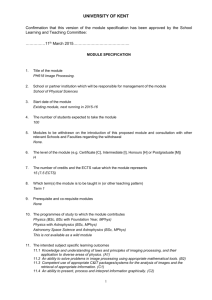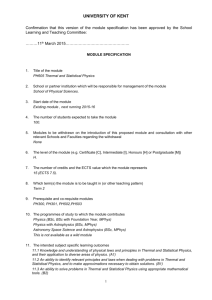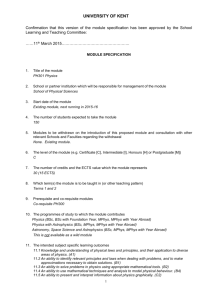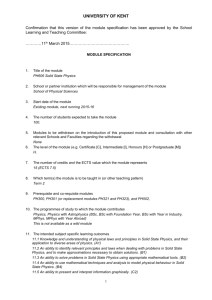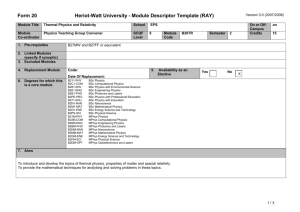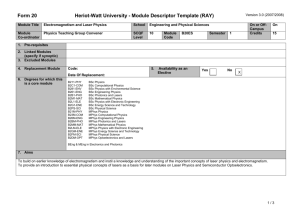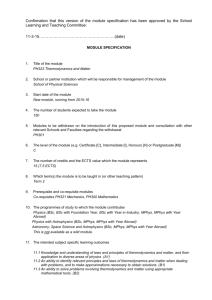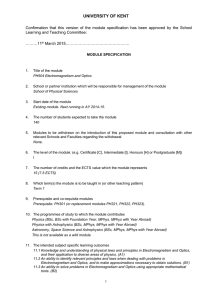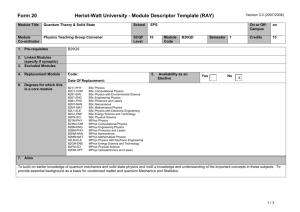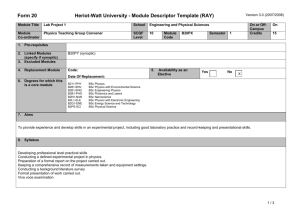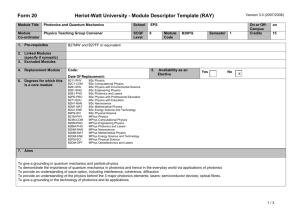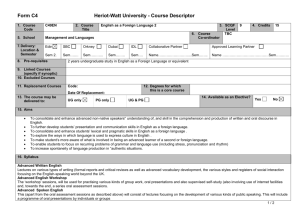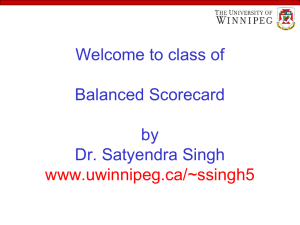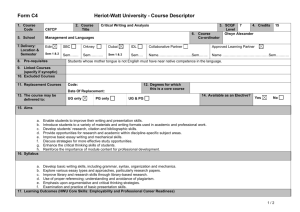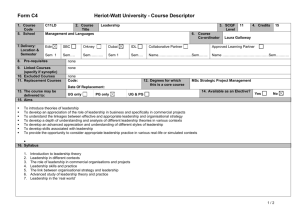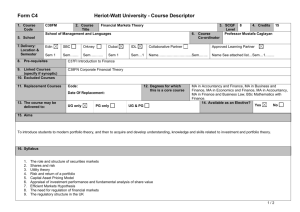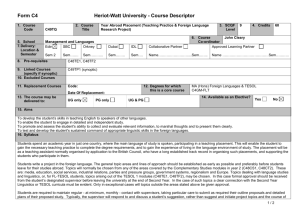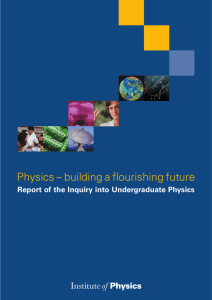B28TP - Thermal Physics _ Properties of Matter - Heriot
advertisement
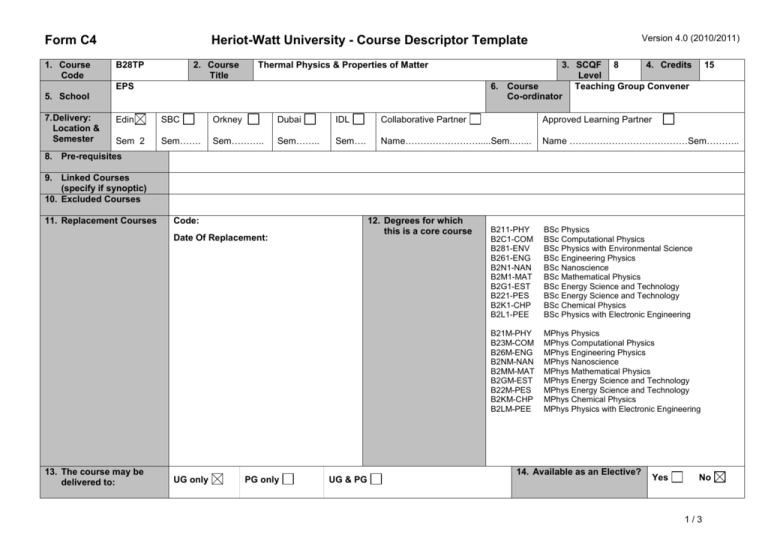
Form C4 1. Course Code B28TP 2. Course Title Thermal Physics & Properties of Matter EPS 5. School 7. Delivery: Location & Semester Version 4.0 (2010/2011) Heriot-Watt University - Course Descriptor Template 3. SCQF 8 4. Credits Level 6. Course Teaching Group Convener Co-ordinator 15 Edin SBC Orkney Dubai IDL Collaborative Partner Approved Learning Partner Sem 2 Sem……. Sem……….. Sem…….. Sem…. Name…………………….....Sem..…... Name …………………………………Sem……….. 8. Pre-requisites 9. Linked Courses (specify if synoptic) 10. Excluded Courses 11. Replacement Courses Code: 12. Degrees for which this is a core course Date Of Replacement: 13. The course may be delivered to: UG only PG only UG & PG B211-PHY B2C1-COM B281-ENV B261-ENG B2N1-NAN B2M1-MAT B2G1-EST B221-PES B2K1-CHP B2L1-PEE BSc Physics BSc Computational Physics BSc Physics with Environmental Science BSc Engineering Physics BSc Nanoscience BSc Mathematical Physics BSc Energy Science and Technology BSc Energy Science and Technology BSc Chemical Physics BSc Physics with Electronic Engineering B21M-PHY B23M-COM B26M-ENG B2NM-NAN B2MM-MAT B2GM-EST B22M-PES B2KM-CHP B2LM-PEE MPhys Physics MPhys Computational Physics MPhys Engineering Physics MPhys Nanoscience MPhys Mathematical Physics MPhys Energy Science and Technology MPhys Energy Science and Technology MPhys Chemical Physics MPhys Physics with Electronic Engineering 14. Available as an Elective? Yes No 1/3 Form C4 Heriot-Watt University - Course Descriptor Template Version 4.0 (2010/2011) 15. Aims To introduce and develop the topics of thermal physics and the properties of matter. To provide the mathematical techniques for analysing and solving problems in these topics. 16. Syllabus Concept of heat and temperature Heat capacities, equipartition of energy, heat transport (conduction, convection and radiation), measurement of temperature and definition of temperature scales, black-body radiation The laws of thermodynamics Zeroth Law; First law of thermodynamics (concepts of work and internal energy); Second law of thermodynamics (entropy, arrow of time). Free energies. Physics of the atmosphere Phase diagram of water, composition of the atmosphere, pressure gradients (vertical and horizontal), radiation balance and the physics of global warming Generation of energy Carnot cycle, thermodynamic efficiency of turbines and car engines, efficiency of heat pumps and refrigerators, exploitation of nuclear fission and fusion for electricity generation Properties of matter The three phases (gases, liquids, solids) and phase diagrams, kinetic theory of gases, dynamics of fluids including Bernolli’s equation and viscosity; Gas Laws up to Van der Waal’s eqn; Maxwell-Boltzmann distribution & Fermi-Dirac distribution. Mechanical properties of matter: elasticity and thermal expansion. 17. Learning Outcomes (HWU Core Skills: Employability and Professional Career Readiness) Subject Mastery Understanding, Knowledge and Cognitive Scholarship, Enquiry and Research (Research-Informed Learning) Skills On completion of this course, the learner will be able to: • Achieve a critical knowledge and understanding of the properties of matter and thermodynamics • Demonstrate a detailed knowledge and understanding of the course topics • Integrate previous knowledge from the physics programme with the topics discussed in the course • Apply the theory of the course topics to problems or situations not previously encountered 2/3 Form C4 Version 4.0 (2010/2011) Heriot-Watt University - Course Descriptor Template Personal Abilities Industrial, Commercial & Professional Practice Autonomy, Accountability & Working with Others Communication, Numeracy & ICT Personal abilities are embedded in the course. The course provides the opportunity to : Apply the advanced core knowledge expected of a professional physicist to gain professional level insights, Communicate effectively with professional level colleagues Interpret, use and evaluate critically a wide range of data to solve problems of both a familiar and unfamiliar nature Manage time effectively, work to deadlines and prioritise workloads Use a range of ICT skills with on-line materials and web links to support the learning process Apply strategies for appropriate selection of relevant information from a wide source and large body of knowledge Exercise significant initiative and independence in carrying out learning activities and researching information 18. Assessment Methods Method 19. Re-assessment Methods Duration of Exam Weighting (%) Synoptic courses? Method (if applicable) Exam Coursework 2 hours Duration of Exam Diet(s) (if applicable) 70% 30% no no Exam (100%) 2 hours 3 20. Date and Version Date of Proposal 11/8/2014 Date of Approval by School Committee Date of Implementation September 2014 Version Number 3/3 v2
